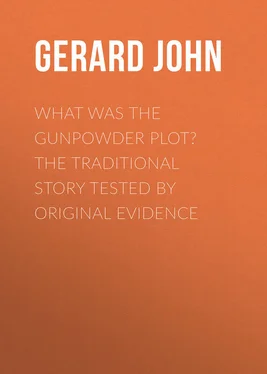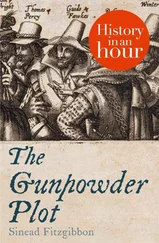John Gerard - What was the Gunpowder Plot? The Traditional Story Tested by Original Evidence
Здесь есть возможность читать онлайн «John Gerard - What was the Gunpowder Plot? The Traditional Story Tested by Original Evidence» — ознакомительный отрывок электронной книги совершенно бесплатно, а после прочтения отрывка купить полную версию. В некоторых случаях можно слушать аудио, скачать через торрент в формате fb2 и присутствует краткое содержание. Жанр: foreign_antique, foreign_prose, на английском языке. Описание произведения, (предисловие) а так же отзывы посетителей доступны на портале библиотеки ЛибКат.
- Название:What was the Gunpowder Plot? The Traditional Story Tested by Original Evidence
- Автор:
- Жанр:
- Год:неизвестен
- ISBN:нет данных
- Рейтинг книги:5 / 5. Голосов: 1
-
Избранное:Добавить в избранное
- Отзывы:
-
Ваша оценка:
- 100
- 1
- 2
- 3
- 4
- 5
What was the Gunpowder Plot? The Traditional Story Tested by Original Evidence: краткое содержание, описание и аннотация
Предлагаем к чтению аннотацию, описание, краткое содержание или предисловие (зависит от того, что написал сам автор книги «What was the Gunpowder Plot? The Traditional Story Tested by Original Evidence»). Если вы не нашли необходимую информацию о книге — напишите в комментариях, мы постараемся отыскать её.
What was the Gunpowder Plot? The Traditional Story Tested by Original Evidence — читать онлайн ознакомительный отрывок
Ниже представлен текст книги, разбитый по страницам. Система сохранения места последней прочитанной страницы, позволяет с удобством читать онлайн бесплатно книгу «What was the Gunpowder Plot? The Traditional Story Tested by Original Evidence», без необходимости каждый раз заново искать на чём Вы остановились. Поставьте закладку, и сможете в любой момент перейти на страницу, на которой закончили чтение.
Интервал:
Закладка:
In times when statesmen could approve such methods of political action, it was inevitable that violent enterprises should have come to be considered the natural resource of those out of power, and it is very clear that there were numerous individuals, of whom no one party had the monopoly, who were ready at any moment to risk everything for the cause they served, and such men, although their proclivities were well known, did not suffer much in public esteem.
The Gunpowder Conspirators were eminently men of this stamp, and notoriously so. So well was their character known, that when, in 1596, eight years before the commencement of the Plot, Queen Elizabeth had been unwell, the Lords of the Council, as a precautionary measure arrested some of the principal amongst them, Catesby, the two Wrights, Tresham, and others, as being persons who would certainly give trouble should a chance occur. 85 85 Camden, the historian, to Sir R. Cotton, March 15th, 1596. (Birch, Original Letters , 2nd series, iii. p. 179.) Various writers erroneously suppose this transaction to have occurred in March, 1603, on occasion of Elizabeth's last illness. The correct date, 1596, given by Sir Henry Ellis, is supplied by a statement contained in the letter, that this was her Majesty's "climacterick year," that is, her sixty-third, this number, as the multiple of the potent factors seven and nine, being held of prime importance in human life. Elizabeth was born in 1533. From Garnet's examination of March 14th, 1605-6 ( Dom. James I. xix. 44), we learn that Catesby was at large at the time of the queen's demise. For Cecil's description of the men, see Winwood's Memorials , ii. 172.
Since that time they had not improved their record. All those above-named, as well as Thomas Winter, Christopher Wright, Percy, Grant, and perhaps others, had been engaged in the ill-starred rebellion of Essex, on which occasion Catesby was wounded, and both he and Tresham came remarkably near being hanged. 86 86 Catesby purchased his life for a fine of 4,000 marks, and Tresham of 3,000. Mr. Jessopp says that the former sum is equivalent at least to £30,000 at the present day. ( Dict. Nat. Biog., Catesby .)
They had likewise been variously implicated in all the seditious attempts which had since been made – Catesby and Tresham being named by Sir Edward Coke as being engaged with Watson in the "Bye." Thomas Winter, Christopher Wright, and Faukes, had, if we may believe the same authority, been sent to Spain on treasonable embassies. 87 87 But see Appendix D, The Spanish Treason .
Grant made himself very conspicuous by frequently resisting the officers of the law when they appeared to search his house. 88 88 Father Gerard says of him that "he paid them [the pursuivants] so well for their labour not with crowns of gold, but with cracked crowns sometimes, and with dry blows instead of drink and other good cheer, that they durst not visit him any more unless they brought store of help with them." ( Narrative of the Gunpowder Plot , p. 86.)
John Wright and Percy had, at least till a very recent period, been notorious bravoes, who made a point of picking a quarrel with any man who was reported to be a good swordsman, they being both expert with the weapon. 89 89 Ibid. , p. 57.
It is evident that men of this stamp were not unlikely to prove restive under such treatment as was meted out to the Catholics, from which moreover, as gentlemen, they themselves suffered in a special degree. Lord Castlemaine remarks that loose people may usually be drawn into a plot when statesmen lay gins, and that it was no hard thing for a Secretary of State, should he desire any such thing, to know of turbulent and ambitious spirits to be his unconscious instruments, 90 90 Catholique Apology , p. 403.
and it is obvious that no great perspicacity would have been required to fix upon those who had given such evidence of their disposition as had these men.
It must, at the same time, be confessed that the character of the plotters is one of the most perplexing features of the Plot. The crime contemplated was without parallel in its brutal and senseless atrocity. There had, it is true, been powder-plots before, notably that which had effected the destruction of the king's own father, Lord Darnley, a fact undoubtedly calculated to make much impression upon the timorous mind of James. But what marked off our Gunpowder Plot from all others, was the wholesale and indiscriminate slaughter in which it must have resulted, and the absence of any possibility that the cause could be benefited which the conspirators had at heart. It was at once reprobated and denounced by the Catholics of England, and by the friends and near relatives of the conspirators themselves. 91 91 E.g. , by Mr. Talbot of Grafton, father-in-law of Robert Winter, who drove their envoys away with threats and reproaches (Jardine, Gunpowder Plot , p. 112), and by Sir Robert Digby, of Coleshill, cousin to Sir Everard, who assisted in taking prisoners. (R.O. Gunpowder Plot Book , 42.)
It might be supposed that those who undertook such an enterprise were criminals of the deepest dye, and ruffians of a more than usually repulsive type. In spite, however, of the turbulent element in their character of which we have seen something, such a judgment would, in the opinion of historians, be altogether erroneous. Far from their being utterly unredeemed villains, it appears, in fact, that apart from the one monstrous transgression which has made them infamous, they should be distinguished in the annals of crime as the least disreputable gang of conspirators who ever plotted a treason. On this point we have ample evidence from those who are by no means their friends. "Atrocious as their whole undertaking was," writes Mr. Gardiner, 92 92 History , i. 263.
"great as must have been the moral obliquity of their minds before they could have conceived such a project, there was at least nothing mean or selfish about them. They boldly risked their lives for what they honestly believed to be the cause of God and of their country. Theirs was a crime which it would never have entered into the heart of any man to commit who was not raised above the low aims of the ordinary criminal." Similarly Mr. Jardine, a still less friendly witness, tells us 93 93 Gunpowder Plot , p. 151.
that "several at least of the conspirators were men of mild and amiable manners, averse to tumults and bloodshed, and dwelling quietly amidst the humanities of domestic life," a description which he applies especially to Rokewood and Digby; while of Guy Faukes himself he says 94 94 Ibid. , p. 38.
that, according to the accounts which we hear of him, he is not to be regarded as a mercenary ruffian, ready for hire to do any deed of blood; but as a zealot, misled by misguided fanaticism, who was, however, by no means destitute either of piety or of humanity. Moreover, as Mr. Jardine farther remarks, the conspirators as a body were of the class which we should least expect to find engaged in desperate enterprises, being, as Sir E. Coke described them, "gentlemen of good houses, of excellent parts, and of very competent fortunes and estates," none of them, except perhaps Catesby, being in pecuniary difficulties, while several – notably Robert Winter, Rokewood, Digby, Tresham, and Grant – were men of large possessions. It has also been observed by a recent biographer of Sir Everard Digby, 95 95 Life of a Conspirator, by one of his Descendants , p. 150.
that, for the furtherance of their projects after the explosion, the confederates were able to provide a sum equal at least to £75,000 of our money – a sufficient proof of their worldly position.
That men of such a class should so lightly and easily have adopted a scheme so desperate and atrocious as that of "murdering a kingdom in its representatives," is undoubtedly not the least incomprehensible feature of this strange story. At the same time it must not be forgotten that there is another, and a very different account of these men, which comes to us on the authority of a Catholic priest living in England at the time, 96 96 English Protestants' Plea and Petition for English Priests and Papists. The author of this book (published 1621) describes himself as a priest who has been for many years on the English mission. His title indicates that he draws his arguments from Protestant sources.
who speaks of the conspirators as follows:
Интервал:
Закладка:
Похожие книги на «What was the Gunpowder Plot? The Traditional Story Tested by Original Evidence»
Представляем Вашему вниманию похожие книги на «What was the Gunpowder Plot? The Traditional Story Tested by Original Evidence» списком для выбора. Мы отобрали схожую по названию и смыслу литературу в надежде предоставить читателям больше вариантов отыскать новые, интересные, ещё непрочитанные произведения.
Обсуждение, отзывы о книге «What was the Gunpowder Plot? The Traditional Story Tested by Original Evidence» и просто собственные мнения читателей. Оставьте ваши комментарии, напишите, что Вы думаете о произведении, его смысле или главных героях. Укажите что конкретно понравилось, а что нет, и почему Вы так считаете.












